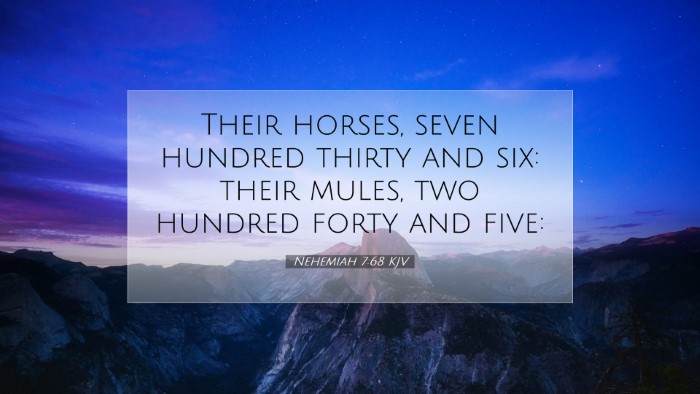Commentary on Nehemiah 7:68
Text of Nehemiah 7:68 (KJV): "Their horses were seven hundred thirty and six; their mules, two hundred forty and five."
Introduction
Nehemiah 7:68 presents a concise account of the resources and obligations of the returned exiles from Babylon. Through enumerations, this verse contributes to the broader narrative of restoration and renewal in Jerusalem. The list of horses and mules shows not only the wealth of those who returned but also hints at the logistical capabilities needed for the rebuilding work that lay ahead.
Historical Context
The return from exile was a monumental event for the Jewish people. After decades in Babylon, the Jewish community sought to reclaim its identity, restore Jerusalem, and re-establish the worship of Yahweh. As Nehemiah undertook the task of rebuilding the walls, he recognized the importance of this census for organizational and spiritual revitalization. Understanding the context sets a framework for interpreting the numbers following Nehemiah’s leadership.
Insights from Matthew Henry
Matthew Henry, in his commentary, emphasizes the significance of counting and organization in the context of returning exiles. He notes that the number 736 horses exhibited a considerable increase considering the exiles’ past hardships. Henry offers reflections on how such assets were integral to the protection and strength of the community now taking shape in Jerusalem.
- Significance of the Horses: Horses were vital for warfare and transportation, indicating readiness to face challenges.
- Symbol of Return: The counting of animals reflects God's restoration of the people’s fortunes, and it serves as a reminder of their covenant relationship with Him.
Insights from Albert Barnes
Albert Barnes provides a more technical interpretation, detailing the logistics involved in the provision of animals for the people returning to Jerusalem. He highlights that the mules, with their lesser number compared to horses, were often used for pack transport, indicating a readiness for labor and rebuilding projects.
- Implications for Ministry: The availability of these resources suggests preparedness for service and ministry. Pastors can draw parallels to how God equips His people for work.
- Comprehending Community Needs: The numbers remind leaders to be conscious of the physical and material needs of the church body today, not only spiritual needs.
Insights from Adam Clarke
Adam Clarke points out the symbolic value of the animals beyond their mere economic value. Clarke asserts that the mention of numbers often conveys deeper theological messages about God's providence and the necessity of communal participation in God’s plans.
- Theological Reflections: Each figure symbolizes the promise of restoration and goes beyond historical record—pointing to God’s faithfulness to Israel.
- Encouragement for Today: Clarke encourages modern readers to view the resources they possess as tools for the kingdom's work and not merely as items of personal wealth.
Theological Implications
The careful enumeration of animals in Nehemiah 7:68 serves as a reflection of divine provision. Churches and individual believers are encouraged to recognize that everything they have—whether talents, resources, or opportunities—are gifts from God intended for His service.
- Faithfulness and Stewardship: Reflecting on these numbers, leaders are challenged to be stewards of what God has provided and to use it wisely in building His kingdom.
- Unity in God’s Work: The logistics of returning to Jerusalem required mutual support and collaboration, which remains essential for the church's mission today.
Conclusion
Nehemiah 7:68 is a significant statement about the resources needed for the community's revival in post-exilic Jerusalem. Through the lens of historical context and theological insight offered by prominent commentators, we grasp that this verse speaks deeply to our understanding of stewardship, community, and continued faithfulness to God's call. As we reflect on our own resources, we are inspired toward active participation in the work of God’s kingdom, equipped and empowered by His Spirit.


